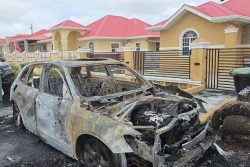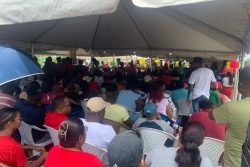Anne-Marie Slaughter, a former director of policy planning in the US State Department (2009-2011), is President and CEO of the New America Foundation, Professor Emerita of Politics and International Affairs at Princeton University, and a member of the World Economic Forum Global Agenda Council on the Future of Governance. She is the author of The Idea That Is America: Keeping Faith with Our Values in a Dangerous World.
WASHINGTON, DC – If not for President Barack Obama’s bold, unexpected diplomatic breakthrough with Cuba, the last weeks of 2014 would have been relentlessly unkind to America. The deep flaws in our country’s justice system, the continuing racism in our society, and our government’s recent record of torture and abuse have been on display for the entire world to see.

The video of five police officers subduing and then killing a man, despite his pleas that he could not breathe, could have come from many countries around the world. But the killing of Eric Garner in New York City, like that of Michael Brown in Ferguson, Missouri, last summer and of 12-year-old Tamir Rice in Cleveland in November, reflect the heightened risk that young African-American men face at the hands of the police in many US cities. Indeed, according to one recent analysis, young African-American males are 21 times more likely than young white males to be fatally shot by the police.
Then came the release by the US Senate Select Committee on Intelligence of 528 pages of its report on the CIA’s detention and interrogation programme, established following the September 11, 2001, terrorist attacks on America. What the committee described as an “executive summary” detailed horrific behaviour by government officials acting on instructions from their superiors.
Worse, rather than seeking to make amends for the abuses, at least one group of former US officials sought to justify them. When asked on US television about the estimated 25% of detainees who were innocent, former vice president Dick Cheney responded: “I have no problem as long as we achieve our objective. And our objective is to get the guys who did 9/11 and it is to avoid another attack against the United States.” For their part, some current CIA officials continue to insist on the value of America’s “enhanced interrogation” programme (which Obama halted), despite the Senate report’s conclusion that the techniques it employed yielded no valuable intelligence.
Indeed, other accounts of America’s “global war on terror” also make it clear that many of the people who were detained and tortured were not threats to America’s security – at least not until US actions made them so. The week the Senate report came out, I was reading Anand Gopal’s new book No Good Men Among the Living, which tells contemporary Afghanistan’s story through the eyes of a supporter of former president Hamid Karzai, a Taliban commander, and a Kabul-born housewife who spent years in purdah in Taliban country.
Over and over again, the same story plays out: a local power-broker is willing, even eager, to support the new US-backed government, only to be denounced as a Taliban member by a fellow Afghan – typically for local political or personal reasons – to unwitting American troops. Indeed, this pattern recurs in the accounts of anyone who has lived in Afghanistan, spoken the language, and understood the workings of patronage and power there. It was often these denounced men who were detained – and tortured – for years.
From my vantage point as a US foreign-policy expert, the only bright spot in recent months has been Obama’s normalization of diplomatic relations with Cuba. Finally, America has an opportunity to launch a new beginning, not only with Cuba but also with the Caribbean and Latin American countries that have pressed us hard and often to change our stance. Indeed, the move will stand as one of Obama’s most substantial foreign-policy achievements, with implications that will reverberate for decades.
Yet a common theme runs through all of these recent events, good and bad alike. In each case, US institutions and officials held other US institutions and officials to account.
Congress documented and publicized the actions of the executive branch in the torture report. Senator Dianne Feinstein worked doggedly to ensure that the Senate intelligence committee could research and document US interrogation practices, even in the face of staunch opposition by the CIA (which even surreptitiously searched the committee’s computers).
“There are those who will seize upon the report and say ‘see what Americans did,’” Feinstein said, “and they will try to use it to justify evil actions or to incite more violence. We cannot prevent that. But history will judge us by our commitment to a just society governed by law and the willingness to face an ugly truth and say ‘never again.’”
Likewise, the press and many civil-society groups documented and publicized not only the killings of Brown, Garner, and others, but also how those cases reflected a pattern of racially disparate treatment by the police. And when Obama announced the restoration of full diplomatic relations with Cuba, the White House described the last half-century of US policy as a “failed approach,” isolating the US, constraining its influence in hemispheric politics, and tying its hands in Cuba itself.
Americans are no better (and no worse) than anyone else. We have no right to moralize, and we have much to learn from others. Fortunately, our founding fathers gave us the exceptional gift of a political system that pushes us continually in the direction of self-correction.
The ability to correct wrongdoing can never justify doing wrong in the first place. The point of exposure is not to celebrate our ability to expose. We Americans must learn how to look at ourselves and our government the way others do. We have much to answer for. But at least we know that we have asked the right questions. © Project Syndicate
This article was received from Project Syndicate, an international not-for-profit association of newspapers dedicated to hosting a global debate on the key issues shaping our world.






